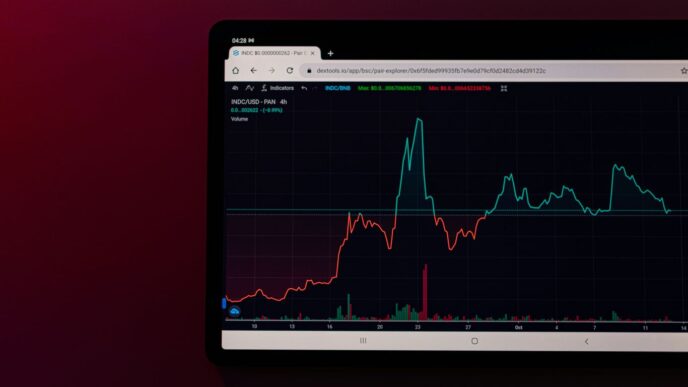Cryptocurrency has certainly gotten a lot of buzz lately. Some folks see it as the next big thing, a game-changer for how we handle money. But before you jump on the bandwagon and throw your hard-earned cash into digital assets, it’s really important to pump the brakes and think about the possible downsides. This article is all about why cryptocurrency is bad for your portfolio and what you should consider before getting involved.
Key Takeaways
- Cryptocurrency isn’t like traditional investments; its value often depends on what people think it’s worth, not on solid financial facts.
- Adding crypto to your investment mix might not make your portfolio safer, and its wild price swings can actually make things more unpredictable.
- The digital asset world isn’t really watched over by anyone, which means there’s a higher chance of scams and shady dealings.
- Some people worry that cryptocurrency makes it easier for criminals to do bad things and that it doesn’t really help society in a big way.
- Owning cryptocurrency doesn’t mean you own a piece of the underlying technology, and its value can jump around a lot, which is risky.
The Volatility Trap: Why Cryptocurrency Is Bad for Stability
When people talk about cryptocurrency, they often focus on the big wins, the stories of folks getting rich quick. But let’s be real, that’s not the whole picture. The truth is, crypto markets are incredibly jumpy. We’re talking about prices that can swing wildly, sometimes by thousands of dollars, in just a single day. This isn’t like the stock market, where things tend to move more slowly. With crypto, it feels more like a rollercoaster, and not always a fun one.
Extreme Price Swings
This wild movement isn’t just a little bit of excitement; it’s a core feature of crypto. Think about Bitcoin, for example. One day it might be worth a lot, and the next day, it could be worth significantly less. Why does this happen? A lot of it comes down to speculation – people buying because they think the price will go up, not necessarily because the crypto itself has some inherent value. Then you have news, or even just a few influential people talking about it online, and suddenly the price can do something totally unexpected. It makes it really hard to plan anything if you’re relying on this kind of money. You can’t really count on it being there when you need it.
Not a Hedge Against Inflation
Some people try to sell crypto as a way to protect your money from inflation, like gold does. The idea is that since there’s only so much of it, it can’t be devalued like regular money. But when you look at what actually happens, it doesn’t seem to work that way. During times when prices for everything else are going up, crypto has often gone down. It acts more like a risky bet than a safe place to park your money when the economy is shaky. It doesn’t seem to behave like those traditional safe assets that people turn to when they’re worried about inflation.
Undermining Portfolio Compounding
When your investments jump around a lot, it messes with how your money grows over time. Imagine you have two investments that, on average, make the same amount of money. But one of them has smaller ups and downs, while the other is all over the place. That steadier one will actually end up being worth more in the long run because the gains build on each other more reliably. Crypto’s big price swings can really disrupt this compounding effect. It means that even if you see some big gains, the overall growth of your savings might be slower than you think, making it harder to reach your financial goals.
The Perils of Unregulated Digital Assets
The world of cryptocurrency often feels like the Wild West, and that’s largely because it operates with very little oversight. While some people like the idea of being free from government control, this lack of regulation really opens the door to some serious risks. It’s like investing in something where there’s no referee, and not everyone playing the game has good intentions.
Vulnerability to Fraud and Manipulation
Because there’s no central authority keeping an eye on things, crypto markets are easy targets for scams. You’ll hear about ‘pump-and-dump’ schemes all the time. Basically, a group of people will hype up a coin, making its price shoot up, and then they all sell their holdings at the peak, leaving everyone else with worthless digital tokens. Since there’s no one to report this to or to investigate, catching these fraudsters is incredibly difficult. It’s like a free-for-all where the dishonest can often get away with it.
Absence of Legal Tender Status
Most countries don’t recognize cryptocurrencies as legal tender. What does that mean for you? It means businesses aren’t required to accept them as payment for goods or services. So, trying to pay your rent or even just grab a coffee with Bitcoin can be a hassle. The value can also change so much between the moment you decide to pay and when the transaction actually goes through, making it pretty unreliable for everyday purchases. It’s not exactly convenient.
Potential for Detrimental Government Regulations
On the flip side of having no regulation, there’s also the risk that governments could step in with really strict rules, or even outright bans. If cryptocurrencies start to look like a threat to financial stability, or if they’re used too much for illegal stuff, governments might decide to crack down hard. This uncertainty is a big risk for anyone holding crypto. It’s a bit of a tricky situation: the lack of rules attracts some people, but it also makes the whole system vulnerable to being shut down by authorities.
The Illusion of Digital Gold: Why Cryptocurrency Is Bad as a Store of Value

A lot of people talk about cryptocurrency like it’s the new gold, a safe place to put your money when the economy gets shaky. But honestly, when you really look at it, that comparison doesn’t hold up. Gold has been around forever, and it’s useful for more than just looking shiny; it has real, tangible value. Crypto, though? Its worth often comes down to what people think it’s worth, or what they hope it will be worth, rather than any solid backing. This makes it a pretty risky bet if you’re just trying to keep your money safe.
Lack of Economic Fundamentals
Think about things we usually consider good places to store value, like gold or property. Gold has actual uses in industry, and it’s a limited resource. Property gives you a place to live or can be rented out for income. Cryptocurrencies don’t really have that. They aren’t tied to anything concrete. Their price is mostly about who wants to buy them and who wants to sell them, and that can change on a dime based on what’s trending online or what a few big players decide to do. It’s not based on how much it costs to produce or any real-world utility, which is a big difference from traditional assets. The price of Bitcoin, for instance, isn’t really about economic facts, but more about guessing if more people will use it later on.
High Volatility Undermines Stability
If you want something to be a good store of value, it needs to be pretty steady. You want to know that what you have today will still be worth roughly the same tomorrow, or next month. Cryptocurrencies are famous for the opposite. Their prices can shoot up or crash down dramatically in just a few hours. This kind of wild movement makes it really hard to rely on them for anything stable. It’s like trying to store water in a leaky bucket; the whole point of storing is to keep it, but it just keeps disappearing or overflowing unpredictably. This constant up and down just doesn’t work if you’re looking for a reliable way to hold onto your wealth. It’s a far cry from the stability you’d expect from a store of value.
More Aligned With Collectibles Than Commodities
Instead of being like digital gold, crypto feels more like collecting rare art or vintage baseball cards. These things get their value from being scarce and from how much people want them, not because they do anything useful. Like those collectibles, crypto prices are often pushed around by feelings and speculation. This can lead to big price bubbles that eventually burst. It’s more about the hype and the chase than any real, lasting worth. You might as well be collecting Beanie Babies; their value is tied to how many were made and how many people want them, not to any inherent usefulness. It’s a bit like owning a piece of the [digital art market], where value is subjective and driven by trends.
Speculation Drives Price, Not Value
It’s easy to get swept up in the excitement surrounding cryptocurrencies, but it’s important to understand what’s really going on. Are you actually investing, or are you just speculating? There’s a pretty big difference, and it can really mess with your portfolio. A lot of people are drawn to crypto because they see the chance for fast, big profits. But that potential comes with some serious risk. It’s not like putting money into established companies with a history. It feels more like betting on a new trend that might or might not catch on.
No Expected Premium for Risk Bearing
Unlike more traditional assets, cryptocurrency doesn’t really offer a clear reward for the risk you’re taking. Stocks, for instance, have historically provided better returns to make up for their ups and downs. Bonds offer stability and income. Crypto, though? Its price swings are wild, but there’s no guarantee you’ll actually get paid for putting up with them. You’re basically betting on future adoption and speculation, not on any real economic worth. It’s more like gambling than investing, and you can read more about investment risk if you want to understand that better.
Uncertainty Outweighs Potential Benefits
Adding any new asset to your portfolio should be done with careful thought. Does the possible good stuff outweigh all the uncertainty? With crypto, the uncertainty is huge. Things like government rules changing, new technology popping up, and shifts in what people think can all send prices crashing down. It’s tough to figure out the potential good things when the future is so unclear. It’s kind of like trying to guess the weather a year from now – good luck with that!
Speculation Drives Price, Not Value
Crypto prices are mostly pushed by speculation, not by any real underlying value. This means prices can shoot up based on hype and the fear of missing out (FOMO), and then drop just as fast when the hype dies down. This makes it hard to figure out the true worth of Bitcoin’s ability to diversify your portfolio. It’s more like a lottery ticket than a solid investment. Think of it this way: a balanced portfolio is like a healthy meal. You need different food groups to get all the nutrients. Adding crypto is like adding a bunch of candy – it might taste good for a bit, but it won’t give you long-term health and stability.
Why Cryptocurrency Is Bad for Societal Well-being
While the idea of decentralized finance sounds pretty cool to some, we really need to talk about how crypto can mess things up for society as a whole. It’s not just about whether your investment goes up or down; it’s about the bigger picture, and honestly, there are some pretty big problems.
Enabling Criminal Activities and Money Laundering
This is a big one. Because crypto transactions can be hard to track, it’s become a favorite tool for people doing illegal stuff. Think about it: criminals can use it to move dirty money around without leaving an easy-to-follow paper trail. This makes it way easier for them to fund illegal operations, from drug trafficking to terrorism. It’s not that everyone using crypto is a criminal, not at all, but the system itself provides a convenient way for those who are to operate more freely. It really complicates law enforcement’s job.
Lack of Productive Service to Society
Most traditional businesses, even ones that aren’t super exciting, actually do something. They create jobs, build things, or offer services people need. Crypto, on the other hand, often doesn’t have that kind of real-world utility. Its value is mostly based on what people think it’s worth, or what they hope someone else will pay for it later. It’s more like a digital collectible or a bet than something that actually contributes to the economy in a tangible way. We’re not building bridges or curing diseases with most of this stuff.
Circumventing Just Laws
Another issue is how crypto can be used to dodge taxes and regulations. While some people might see this as a way to fight against what they consider unfair laws, it also means less money for things we all rely on, like schools, roads, and hospitals. When a significant number of people can opt out of contributing financially to society, it puts a strain on everyone else and can widen the gap between the rich and the poor. It’s a slippery slope that can weaken the systems that keep our communities running.
The Misconception of Blockchain Ownership
It’s pretty common to hear people talk about buying Bitcoin or other digital coins and think they’re somehow getting a piece of the actual blockchain technology. This is a big misunderstanding, and it’s important to clear it up. Owning a cryptocurrency doesn’t mean you own the underlying blockchain.
Think about it this way: buying a domain name for a website, like example.com, doesn’t give you ownership of the internet itself, right? You own the address, but not the whole network. It’s a similar idea with crypto. When you buy Bitcoin, you own that specific digital asset, which is recorded on the Bitcoin blockchain. But the blockchain itself? That’s a shared, public ledger. No single person owns it. It’s more like owning a ticket to a concert than owning the venue.
Here’s a breakdown of why this distinction matters:
- Different Blockchains, Different Rules: The technology behind Bitcoin is not the same as the technology used by Ethereum, or by companies for supply chain management. Each blockchain has its own unique setup and rules. So, even if you could somehow own a sliver of the Bitcoin blockchain, it wouldn’t give you any say or control over other blockchains.
- Technology vs. Asset: Owning cryptocurrency is like owning a specific digital collectible or a share in a company. The blockchain is the technology that makes it all possible, like the internet infrastructure that allows websites to exist. You benefit from the network, but you don’t own the network.
- Value is in the Application: The real value people seek is in the specific digital assets or the applications built on top of blockchains, not in the blockchain technology itself. It’s like valuing a specific website or online service rather than the HTTP protocol that makes the web work. Understanding this helps avoid getting caught up in hype and makes for clearer investment choices. Remember, hackers don’t typically breach blockchains themselves but rather steal exposed private keys, highlighting a critical vulnerability that business leaders must understand [94c0].
So, when you invest in crypto, you’re buying a digital token, not a piece of the distributed ledger technology. It’s a subtle but important difference to grasp.
So, What’s the Takeaway?
Look, cryptocurrency is definitely a hot topic, and it’s easy to get caught up in the hype. But when you really break it down, it’s not like putting your money into a stock or a bond. Its value bounces around a lot, mostly based on what people think it’s worth, not on any solid business or real-world use. Plus, the whole space is pretty much the Wild West when it comes to rules, meaning scams can happen and you might not have much help if something goes wrong. It doesn’t really help build things or create jobs like other investments do, and it can even make it easier for bad actors to do shady stuff. So, before you decide to jump in, remember that while some people might get lucky, for most of us trying to build a secure financial future, the risks just seem too high. It’s probably smarter to stick with investments that have a clearer path and less wild guessing involved.
Frequently Asked Questions
Why isn’t cryptocurrency a good way to keep my money safe over time?
Cryptocurrency doesn’t have any real backing, like gold or a promise from a government. Its worth mostly depends on what people think it’s worth and if more people will use it later. This makes its value jump around a lot, which isn’t good for keeping your money safe for a long time.
How does adding cryptocurrency affect my investments?
Putting crypto into your investments might seem like a way to spread out your risk, but it’s really unpredictable. Unlike stocks or bonds, there’s no clear reason to think it will grow steadily. Its price is mostly based on people guessing what it will do next, not on any real business value.
What are the dangers of digital money that isn’t regulated?
Because there are very few rules for crypto, it’s easier for dishonest people to cheat others or control prices. Also, no country officially accepts it as money, so you can’t use it everywhere. Governments could also create new rules that could really hurt its value.
Is cryptocurrency harmful to society?
Some people worry that crypto makes it easier for criminals to hide money or do illegal things because transactions can be hard to track. It also doesn’t really create new goods or services that help society, unlike traditional businesses.
What does it mean that cryptocurrency is ‘speculative’?
Buying crypto is often more like gambling than investing. People buy it hoping to make a lot of money quickly because its price can change a lot. But this also means you can lose a lot of money just as fast. It’s driven by the hope of quick gains, not steady growth.
If I own Bitcoin, do I own a piece of the blockchain technology?
When you buy Bitcoin, you don’t own a piece of the technology behind it, called blockchain. It’s like buying a website address doesn’t mean you own the whole internet. Different cryptocurrencies use different kinds of blockchain, and the technology itself is separate from the coins.












